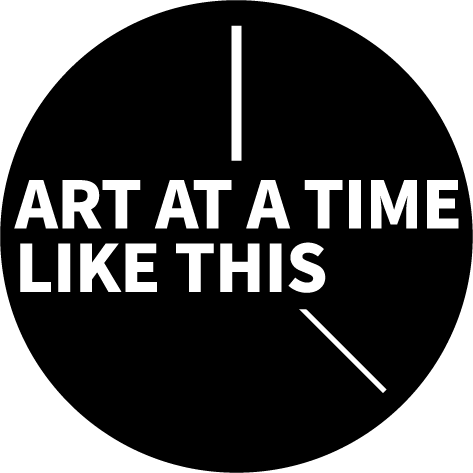
Miwako Tezuka
Curator’s Statement:
We learn from history that we learn nothing from history, so said Hegel. Sachiko Kazama’s work is a persistent refutation of this cynical view of history, by way of cynicism. Kazama was born in 1972 in Tokyo, which puts her formative years as an artist in the era of Japan’s incredible rise during the bubble economy and its rather anticlimactic, sluggish fall from grace. In an extremely ironical sense, Japan has been, or should have been, in the mood for self-reflection, self-criticism, and learning from the recent past, way before the rest of the world joined in such a mood due to the current pandemic. The points of reflection are many—greed of capitalism, dehumanization through modernism, neglect of the environment, etc.
Stylistically, Kazama’s prints in blunt monochrome recall the legacy of early 20th century Proletarian printmakers or the Japanese “gekiga” (dramatic pictures) comic tradition that began in the 1950s. But, hers are each unique print carved and printed solely by the artist herself, and they often take on a grand scale of history painting. This hybridity of style and scale endows her work with a dramatic aura and captivates us to read deeper into the dark humor, Kazama’s brand of cynicism. Ultimately, we come to question if history is a linear narrative or itself a process of learning.
Miwako Tezuka, PhD
Associate Director
Reversible Destiny Foundation, NYC
Sachiko Kazama
コロナ以前の「元の暮らしに戻りたい」それが大多数の人たちの希望かもしれません。でもそれでいいのでしょうか?パンデミックは人類滅亡の未来像を突きつけて来ました。そのことで地球にとって人類はどんな存在か考えさせられました。また、通常運転さえしていれば順調だと思ってた資本主義社会は、ちょっと歯車を止めただけで人間を死に追いやる恐ろしいシステムだとも気付かされました。 正直言うと、私は「止まってしまった」今の状況が少し気に入っています。トーマス・マンの小説『魔の山』の主人公がサナトリウムという世間から隔絶された場で獲得した、長大な思考の時間のように、ステイホームの時間には、平時に比べてずっと思考するいとまがあります。思考の中では、人類滅亡の世界も、エコノミストの理想に反する不謹慎な世界も自由に空想することができます。
コロナ以後のパラダイムシフトの可能性は「完璧には元の暮らしに戻れない」ことにあるように思えます。人間の移動が制限され、飛行機、自動車、工場などの稼働が減ると、温室効果ガスの発生も減少することがハッキリしました。今までより経済活動を抑えて、その代わりに思考し創造する時間を増やせば、環境にも文化にも良い影響があるに違いありません。経済の歯車を回してきた合理主義は、人間の存在を必要以上に大きくし尊大にさせました。人間が本来あるべき小さい姿に戻ること、この難題を考える時間は…まだしばらくはありそうです。(風間サチコ)
Perhaps most people want to return to their original lives before the corona. But is that okay? The pandemic has shown us a vision of the future of the fall of mankind and made us think what human beings were like on earth. Also, the capitalist society, which we thought would be good if only it worked, proved to be a terrible system, able to kill people just by stopping the gears. To tell the truth, I'm a little fond of the situation that is now "stopped." Like the time for long thoughts that the hero of Thomas Mann's novel, "The Magic Mountain," has gained from being separated from the world in a place by the name of Sanatorium. There are times when he stays home, and are much more thoughtful than in peacetime. In my thoughts I can freely dream of the fall of mankind and of the unscrupulous world, contrary to the ideals of the economists. The possibility of a paradigm shift after the corona virus seems to be that "it's impossible to completely return to life as it was before." It was clear that as human movement was restricted and the operation of airplanes, cars, factories etc. decreased, the generation of greenhouse gases would also decrease. If we control economic activity more than ever, and instead increase the amount of time we think and create, there must be positive impacts on the environment and culture. Rationalism, which has driven the gears of the economy, has made the existence of man more than necessary and arrogant. The time to think about this challenge is...It's likely to continue for a while. (Sachiko Kazama)
「ディスリンピック2680」 Dyslimpic 2680, 2018, woodcut print (Japanese paper, oil ink), 242.4×640.5cm
Photo: Kei Miyajima © Sachiko Kazama Courtesy of MUJIN-TO Production
「臆!怒涛の閉塞艦」 Alas! Heisoku-kan (Raging Battle-ship the Dead-end), 2012, woodcut print (panel, Japanese paper, sumi ink), 181×418cm
Photo: Kei Miyajima © Sachiko Kazama Courtesy of MUJIN-TO Production
「獄門核分裂235」 Prison NUKE FISSION 235, 2012, woodcut print (panel, Japanese paper, sumi ink), 181×120cm Photo: Kei Miyajima © Sachiko Kazama Courtesy of MUJIN-TO Production
「人外交差点」 Nonhuman Crossing, 2013, woodcut print (panel, Japanese paper, oil ink), 180×360cm
Photo: Osamu Watanabe Courtesy of Mori Art Museum
「獲物は狩人になる夢を見る」 A target dreams of becoming a hunter, 2016, woodcut print (panel, Japanese paper, sumi ink), 91.3×121cm
Photo: Kei Miyajima © Sachiko Kazama Courtesy of MUJIN-TO Production
「バベル」 BABEL, 2019, woodcut print (panel, Japanese paper, oil ink), 130 × 181 cm
Photo: Kenji Morita © Sachiko Kazama Courtesy of MUJIN-TO Production
Sachiko Kazama
All images courtesy of the artist and MUJIN-TO Production






